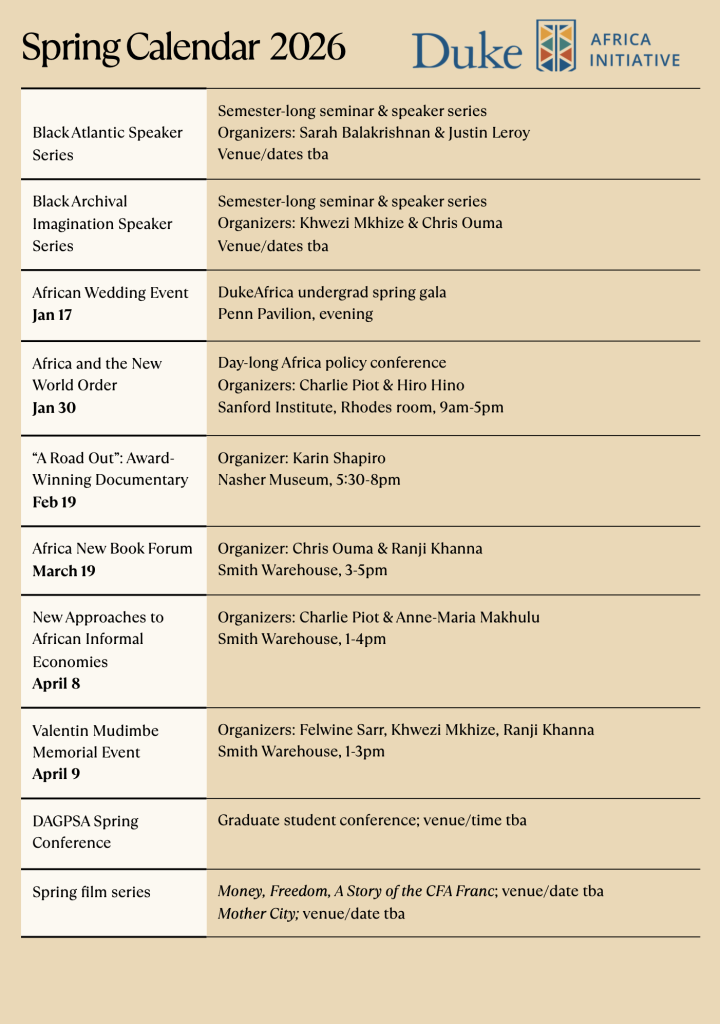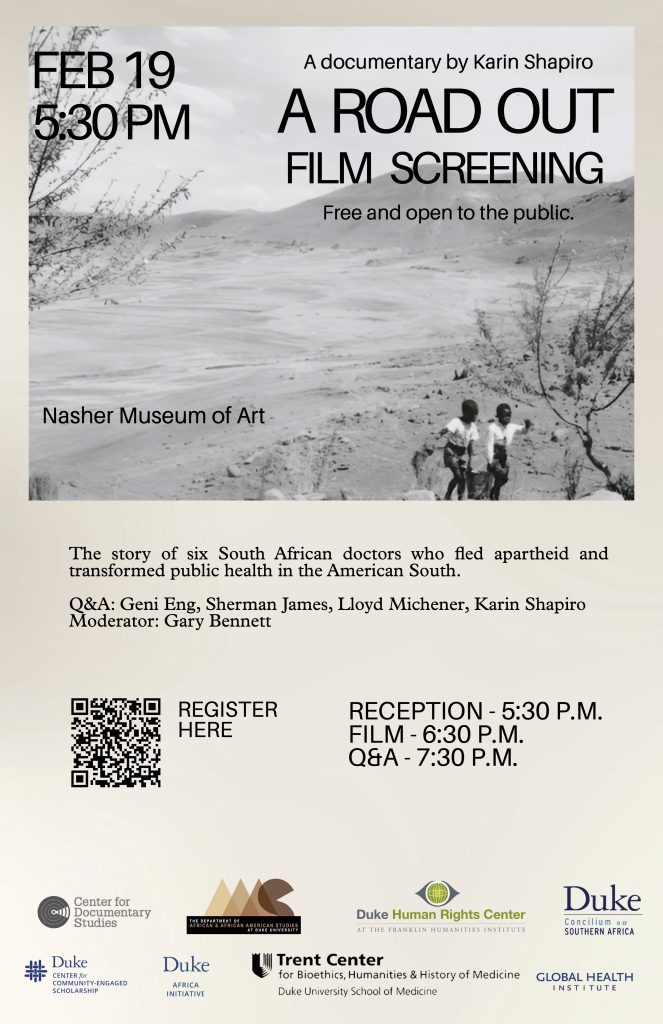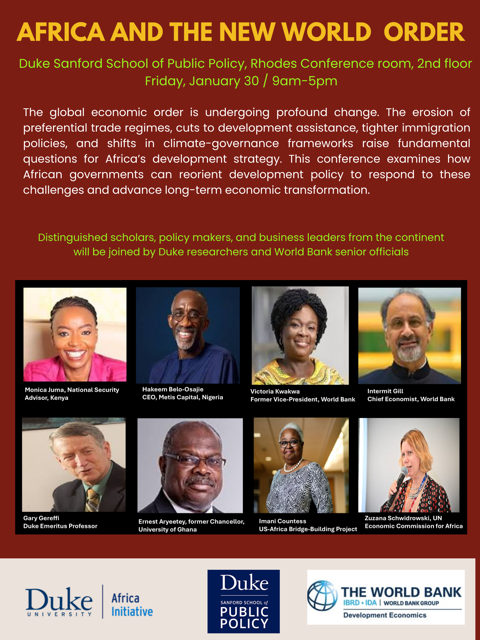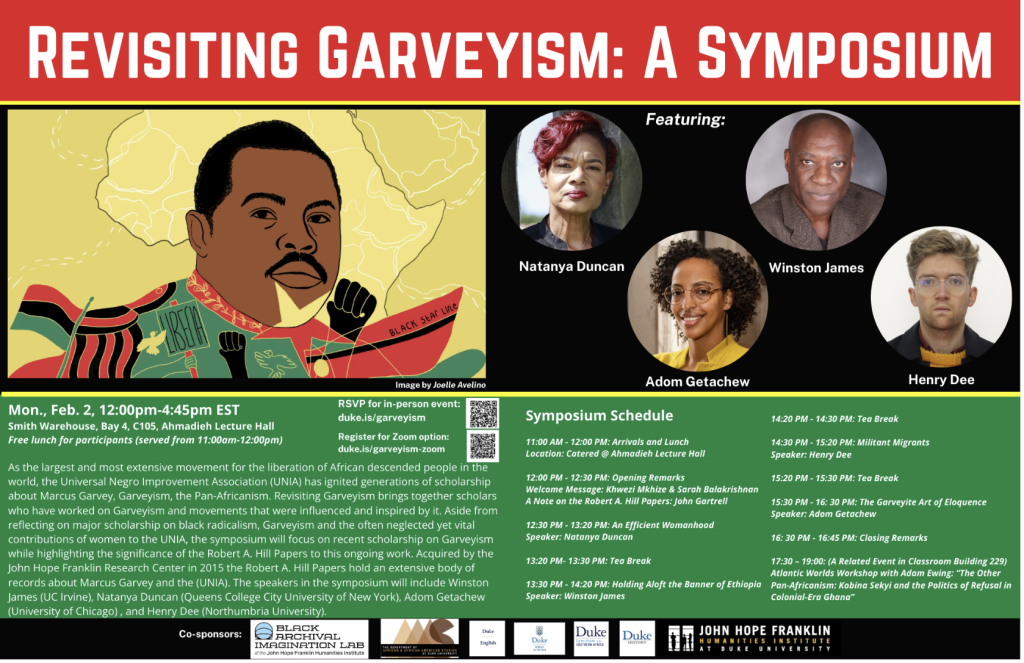
SPRING AI CALENDAR

UPCOMING EVENTS
Documentary Film Screening: A Road Out
Free and open to the public with Reception and Q&A
Date: Thursday, February 19, 2026
Time: 5:30 PM – 8:30 PM
Location: Nasher Museum of Art

You are warmly invited to attend a free screening of A Road Out, a documentary about six South African health pioneers who reshaped community medicine in the United States. Escaping apartheid, they brought lessons learned in rural KwaZulu-Natal to North Carolina and the American South. An official selection of several international film festivals, the film uses photographs, interviews and maps to explore how community health initiatives cross borders and cultures.
Schedule
Reception: 5:30 PM
Film: 6:30 PM
Q&A: 7:30 PM
The screening will be followed by a Q&A moderated by Gary Bennett with the film’s director and key public health researchers featured in the documentary.
- Geni Eng, UNC
- Sherman James, Duke and UNC
- Lloyd Michener, Duke
- Karin Shapiro, African and African American Studies, Duke
Register today: https://duke.qualtrics.com/jfe/form/SV_7agBoG20n7yqBfM
For their bios, please see the Nasher link: https://nasher.duke.edu/event/film-screening-and-panel-a-road-out/
Parking is available at:
The Nasher: 2001 Campus Dr, Durham, NC 27705
H-parking lot: 264-298 Anderson St, Durham, NC 27705, close to Duke Gardens
Karsh Alumni Center: 2080 Duke University Rd – the gravel lot across the street is available
Street Parking
Africa and the New World Order
Date: Friday, January 30th, 2026
Time: 9 am – 5 pm
Location: Duke Sanford School of Public Policy, Rhodes Conference Room, 2nd Floor

Revisiting Garveyism: A Symposium
Date: Mon, Feb 2, 2026
Time: 12:00 pm-4:45 pm EST
Location: Smith Warehouse, Bay 4, C105, Ahmadieh Lecture Hall
Free lunch for participants (served from 11:00 am-12:00 pm)
RSVP for in-person event: duke.is/garveyism
Register for Zoom option: duke.is/garveyism-zoom

As the largest and most extensive movement for the liberation of African descended people in the world, the Universal Negro Improvement Association (UNIA) has ignited generations of scholarship about Marcus Garvey, Garveyism, the Pan-Africanism. Revisiting Garveyism brings together scholars who have worked on Garveyism and movements that were influenced and inspired by it. Aside from reflecting on major scholarship on black radicalism, Garveyism and the often neglected yet vital contributions of women to the UNIA, the symposium will focus on recent scholarship on Garveyism while highlighting the significance of the Robert A. Hill Papers to this ongoing work. Acquired by the John Hope Franklin Research Center in 2015 the Robert A. Hill Papers hold an extensive body of records about Marcus Garvey and the (UNIA). The speakers in the symposium will include Winston James (UC Irvine), Natanya Duncan (Queens College City University of New York), Adom Getachew (University of Chicago) and Henry Dee (Northumbria University). (See below for the speakers’ bios.)
Symposium Schedule:
11:00 AM – 12:00 PM: Arrivals and Lunch
Location: Catered @ Ahmadieh Lecture Hall
12:00 PM – 12:30 PM: Opening Remarks
Welcome Message: Khwezi Mkhize & Sarah Balakrishnan
A Note on the Robert A. Hill Papers: John Gartrell
12:30 PM – 13:20 PM: An Efficient Womanhood
Speaker: Natanya Duncan
13:20 PM- 13:30 PM: Tea Break
13:30 PM – 14:20 PM: Holding Aloft the Banner of Ethiopia
Speaker: Winston James
14:20 PM – 14:30 PM: Tea Break
14:30 PM – 15:20 PM: Militant Migrants
Speaker: Henry Dee
15:20 PM – 15:30 PM: Tea Break
15:30 PM – 16: 30 PM: The Garveyite Art of Eloquence
Speaker: Adom Getachew
16: 30 PM – 16:45 PM: Closing Remarks
17:30 PM – 19:00 PM: (A Related Event in Classroom Building 229)
Atlantic Worlds Workshop with Adam Ewing: “The Other Pan-Africanism: Kobina Sekyi and the Politics of Refusal in Colonial-Era Ghana”
Speaker Bios
Natanya Duncan an Associate Professor of History. A historian of the African Diaspora, her research and teaching focuses on global freedom movements of the 20th and 21st Century. Duncan’s research interest includes constructions of identity and nation building amongst women of color; migrations; color and class in Diasporic communities; and the engagements of intellectuals throughout the African Diaspora. Her book, An Efficient Womanhood: Women and the Making of the Universal Negro Improvement Association, published by the University of North Carolina Press in 2025, focuses on the distinct activist strategies in-acted by women in the Universal Negro Improvement Association (UNIA), which Duncan calls an efficient womanhood. Following the ways women in the UNIA scripted their own understanding of Pan Africanism, Black Nationalism and constructions of Diasporic Blackness, the work traces the blending of nationalist and gendered concerns amongst known and lesser known Garveyite women.
Winston James is the author of Claude McKay: The Making of a Black Bolshevik (2022), A Fierce Hatred of Injustice: Claude McKay’s Jamaica and His Poetry of Rebellion (2000), The Struggles of John Brown Russwurm: The Life and Writings of a Pan-Africanist Pioneer, 1799-1851 (2010) and editor with Clive Harris of Inside Babylon: The Caribbean Diaspora in Britain (1993). James won the Gordon K. Lewis Memorial Award for Caribbean Scholarship from the Caribbean Studies Association for Holding Aloft the Banner of Ethiopia: Caribbean Radicalism in Early Twentieth-Century America (1998). Born in Jamaica and grew up in Jamaica and Britain, James earned his doctorate from the London School of Economics and Political Science, University of London. He has taught on both sides of the Atlantic, including Goldsmiths College, University of London, Columbia University and most recently the University of California, Irvine where he is Emeritus Professor of History.
Adom Getachew is Professor of Political Science and Race, Diaspora & Indigeneity and Interim Chair of the Department of Race, Diaspora, and Indigeneity at the University of Chicago. She is a political theorist with research interests in the history of political thought, theories of race and empire, and postcolonial political theory. Her work focuses on the intellectual and political histories of Africa and the Caribbean. She is the author of Worldmaking after Empire: The Rise and Fall of Self-Determination (2019) and co-editor, with Jennifer Pitts, of W. E. B. Du Bois: International Thought (2022). She is currently working on a second book on the intellectual origins and political practices of Garveyism—the black nationalist/pan-African movement, which had its height in the 1920s. Her public writing has appeared in Dissent, Foreign Affairs, the London Review of Books, the Nation, the New York Review of Books, and the New York Times.
Henry Dee is a research fellow at Northumbria University, and a historian of empire, labour and migration in the early 20th century. He has previously taught courses on global labour history, colonial fascism and imperial history. Militant Migrants, a biography of the labour leader Clements Kadalie, came out with Liverpool University Press in November 2025. Together with David Johnson, he has edited a volume of primary sources, ‘I See You’: The Industrial and Commercial Workers’ Union of Africa, 1919-1930. His latest research compares trade unions across Southern Africa, Sri Lanka and Myanmar, and their engagement with the politics of migration in the late British empire.
Co-sponsors: Black Archival Imagination Lab, Africa Initiative, African and African American Studies (AAAS), Concilium on Southern Africa, English, Franklin Humanities Institute (FHI), and History
FALL 2025 SEMESTER EVENTS
Atlantic Worlds Workshop
Monday, November 17 | 11: 45 am
Classroom Building 229 (https://maps.duke.edu/?focus=160)
Speaker: Dr Adom Getachew, University of Chicago

Translating Ngugi Wa Thiong’o’s Legacy Into The Future
Monday, November 17 | 3:00 pm -4:30 pm
Smith Warehouse, Bay 4, Ahmadieh Lecture Hall ( https://maps.duke.edu/?focus=1874)
Speakers: Professor James Ogude and Professor Wangui Wa Goro

African Literature Colloquium
Date: Friday, November 14.
Time: 9:00 am – 3:15 pm
Location : 314 Allen Building

The Atlantic Worlds Workshop

Past Africa Initiative Events
Follow this link to see the past african Initiative Events.